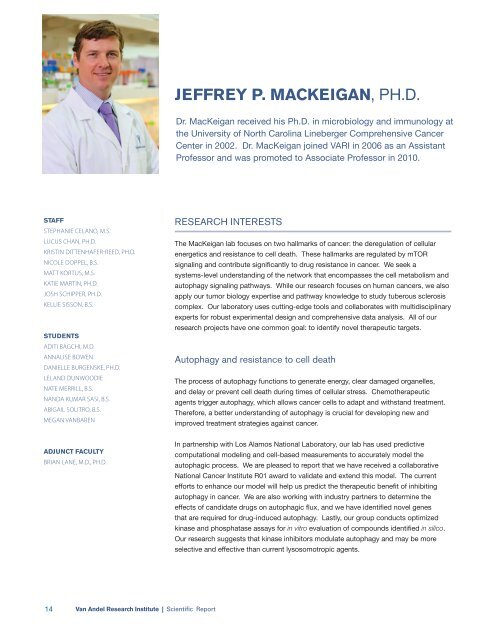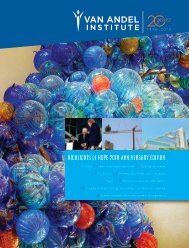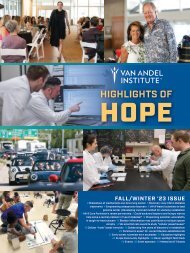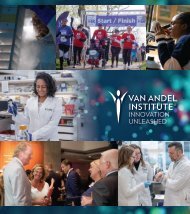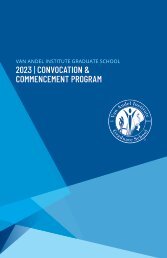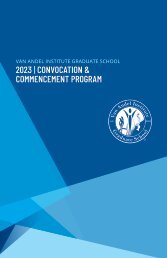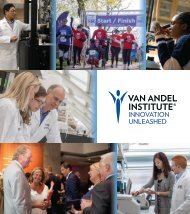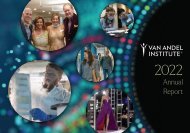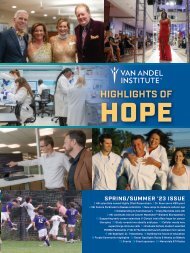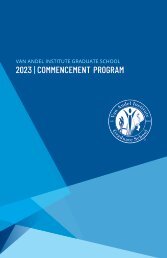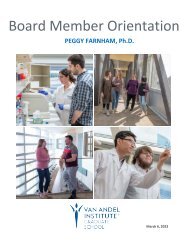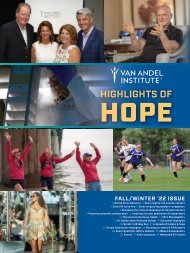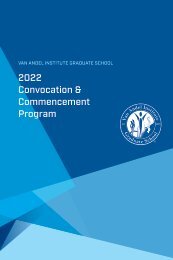2016 Scientific Report
You also want an ePaper? Increase the reach of your titles
YUMPU automatically turns print PDFs into web optimized ePapers that Google loves.
JEFFREY P. MACKEIGAN, PH.D.<br />
Dr. MacKeigan received his Ph.D. in microbiology and immunology at<br />
the University of North Carolina Lineberger Comprehensive Cancer<br />
Center in 2002. Dr. MacKeigan joined VARI in 2006 as an Assistant<br />
Professor and was promoted to Associate Professor in 2010.<br />
STAFF<br />
STEPHANIE CELANO, M.S.<br />
LUCUS CHAN, PH.D.<br />
KRISTIN DITTENHAFER-REED, PH.D.<br />
NICOLE DOPPEL, B.S.<br />
MATT KORTUS, M.S.<br />
KATIE MARTIN, PH.D.<br />
JOSH SCHIPPER, PH.D.<br />
KELLIE SISSON, B.S.<br />
STUDENTS<br />
ADITI BAGCHI, M.D.<br />
ANNALISE BOWEN<br />
DANIELLE BURGENSKE, PH.D.<br />
LELAND DUNWOODIE<br />
NATE MERRILL, B.S.<br />
NANDA KUMAR SASI, B.S.<br />
ABIGAIL SOLITRO, B.S.<br />
MEGAN VANBAREN<br />
RESEARCH INTERESTS<br />
The MacKeigan lab focuses on two hallmarks of cancer: the deregulation of cellular<br />
energetics and resistance to cell death. These hallmarks are regulated by mTOR<br />
signaling and contribute significantly to drug resistance in cancer. We seek a<br />
systems-level understanding of the network that encompasses the cell metabolism and<br />
autophagy signaling pathways. While our research focuses on human cancers, we also<br />
apply our tumor biology expertise and pathway knowledge to study tuberous sclerosis<br />
complex. Our laboratory uses cutting-edge tools and collaborates with multidisciplinary<br />
experts for robust experimental design and comprehensive data analysis. All of our<br />
research projects have one common goal: to identify novel therapeutic targets.<br />
Autophagy and resistance to cell death<br />
The process of autophagy functions to generate energy, clear damaged organelles,<br />
and delay or prevent cell death during times of cellular stress. Chemotherapeutic<br />
agents trigger autophagy, which allows cancer cells to adapt and withstand treatment.<br />
Therefore, a better understanding of autophagy is crucial for developing new and<br />
improved treatment strategies against cancer.<br />
ADJUNCT FACULTY<br />
BRIAN LANE, M.D., PH.D.<br />
In partnership with Los Alamos National Laboratory, our lab has used predictive<br />
computational modeling and cell-based measurements to accurately model the<br />
autophagic process. We are pleased to report that we have received a collaborative<br />
National Cancer Institute R01 award to validate and extend this model. The current<br />
efforts to enhance our model will help us predict the therapeutic benefit of inhibiting<br />
autophagy in cancer. We are also working with industry partners to determine the<br />
effects of candidate drugs on autophagic flux, and we have identified novel genes<br />
that are required for drug-induced autophagy. Lastly, our group conducts optimized<br />
kinase and phosphatase assays for in vitro evaluation of compounds identified in silico.<br />
Our research suggests that kinase inhibitors modulate autophagy and may be more<br />
selective and effective than current lysosomotropic agents.<br />
14 Van Andel Research Institute | <strong>Scientific</strong> <strong>Report</strong>


